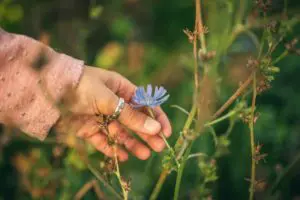How to Become an Herbalist

The aim of this article is to outline a beginning educational program for those who are interested in learning about herbs and herbal healing. By diving deeper into the information provided, you too may discover how to become an herbalist.
First, it is important to know that most herbal practitioners are called herbalists. Herbalists are sometimes referred to as herbologists – someone who studies the science, art, and practice of herbal healing. Most herbalists are lay practitioners. Some are folk healers, and others are highly educated professionals who have devoted their lives to studying the healing properties of plants.
There is no requirement in any state in the U. S. for a license to practice herbal healing. But it is important to know that herbalists are more like allied health professionals, and the practice of medicine is reserved for medical doctors. Herbalism is similar to other alternative professions like massage, chiropractic, acupuncture, and midwifery; all these practices have alternative models of thinking about the body and health.
The resources that I mention below are for the typical persons interested in herbal healing: lay people or alternative health professionals. However, I highly recommend these courses of study for medical professionals who are interested in recommending herbs and how to become and herbalist. This is because herbal healing is a significantly different paradigm than regular medicine and for herbs to be integrated into a medical-type practice (nursing, nutrition, internal medicine), it requires learning a different system of therapeutics
WHERE DO YOU START?
Most herbal learning involves a great deal of studying of theory, philosophy, science, and principles. There is no short cut to reading books and papers, listening to tapes, doing homework, and trying out herbs in the “real world.” It is a process of practical, hands-on learning accompanied by lots of information (didactic education). Most students need a introductory level approach on how to become an herbalist. Here are my recommendations:
The East West Family Herbalist course: A great introduction to herbalism. I have completed all three levels (and more) of their training. If you are going to become a professional herbalist or are going to study Ayurveda or Chinese Medicine, this is an excellent choice.
Dr. Christopher’s School of Natural Healing: This family herbalist course can be done online. They may have a yearly sale in which this course in on sale for $100.00. This is a really good course that covers Western herbal fundamentals.
The Family Herbalist Certification: Steven Horne is a long-time herbalist who has a gift for education. He is the author of Modern Herbal Medicine. I took my first herbal course with Steven in 1990.
Rosemary Gladstar’s Herbal Home-Study Course: A good course but more focused on Western herbal folk healing.
Dr. Tieraona Low Dog’s Foundations in Herbal Medicine: A course by a well known herbalist who is also a medical doctor and Native American. While this does cover the “foundations” this course is intended for in-depth study and costs more than the other schools I’ve listed.
I have learned from all of these herbal teachers and traditions through their books, tapes, and educational materials. I have not studied through Learning Herbs: There are people that like this site and their educational materials.
If you are on a professional track, this distance learning program from North American Institute of Medical Herbalism is also good.
I would recommend this along with the East West School for someone who is going to be a professional herbalist. The North American Institute of Medical Herbalism also has a unique clinical training program that goes to Nicaragua.
WHERE DO YOU GO NEXT?
A number of the trainings above are called “family herbalist” courses and intended to teach beginners to use herbs with their families, friends, neighbors, and community. Becoming a lay herbal healer is often a bridge to becoming a professional herbalist. I think you will find that anyone who finishes an introductory course on herbs feels a sense of achievement and a greater appreciation of just how much work and study goes into being an herbalist. Herbal healing is a life-long endeavor. But no matter what your level of expertise you can apply herbs to your life to improve your own health and help others–and that is a rewarding, life-enhancing, and sometimes profound process.
